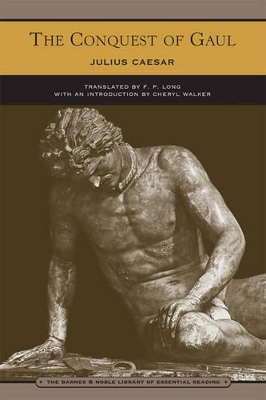Reviewed by viking2917 on
Although undoubtedly Caesar was writing for both then-current political consumption as well as perhaps for posterity, this is a surprisingly frank and detailed account of the 10 years it took Caesar to conquer Gaul (France, Belgium and parts of Germany, Switzerland and Italy). He details both the valor of the Gauls (his enemy) and well as periodic stupidity or cowardice of certain Romans, as well as the to-be-expected accounts of heroism on the part of Romans. His language is strikingly modest and he is constantly naming soldiers of the line and giving credit to others. While again this is partly undoubtedly to encourage political support and loyalty, one can't but believe that Caesar had internalized a leadership style that gave credit to others (whilst undoubtedly seeing the benefit to himself thereby). His account of the cultural practices of the Druids is quite interesting and it's clear that Caesar was a student of the people he hoped to conquer. It's interesting to read quotes such as this - "Next to him (Mars the god) come Apollo, Jupiter, and Minerva, and about them their ideas correspond fairly closely with those current among the rest of mankind, viz. that Apollo expels diseases, that Minerva teaches ...." and speculate on Caesar's own perspective on the gods their potential uses for political purposes.
A common practice of the time to encourage compliance after a victory was the taking of hostages. One can't go more than a few pages without more hostages being taken, often in the hundreds. Indeed later in the book we find that there is almost an entire city dedicating to housing the hostages taken in the war.
We see in the text that Caesar was always mindful of appearance and ceremony. For example, "Caesar was nevertheless strongly of the opinion that to do so by means of boats would neither be unattended by risk, nor worth of his own or his country's dignity." And surprisingly matter-of-fact about the business of war: "It remained, therefore, only to do the work of devastation, and for this a few days were spent in burning the farms and villages and in rooting up the crops". (It is striking how much of the conquest is dictated by weather and seasons - Caesar often retires to Rome for the winter, for example). There is surprising amount of engineering in warfare here - there are many accounts of interesting bridge-building techniques and challenges.
The Conquest of Gaul culminates in the battle of Alesia where the Gaul King Vercingetorix surrenders to Caesar after a prolonged siege and battle. (The description of the innovations Caesar and his army made in fortifications are quite interesting.). Interestingly enough there is little description of Vercingetorix's fate in the book (nor much celebration of what would prove the final victory for Caesar), but he would be sent to Rome, kept a prisoner for 5 years, and executed during Caesar's triumph, but that time period is not covered by the book.
Reading updates
- Started reading
- 16 September, 2014: Finished reading
- 16 September, 2014: Reviewed
